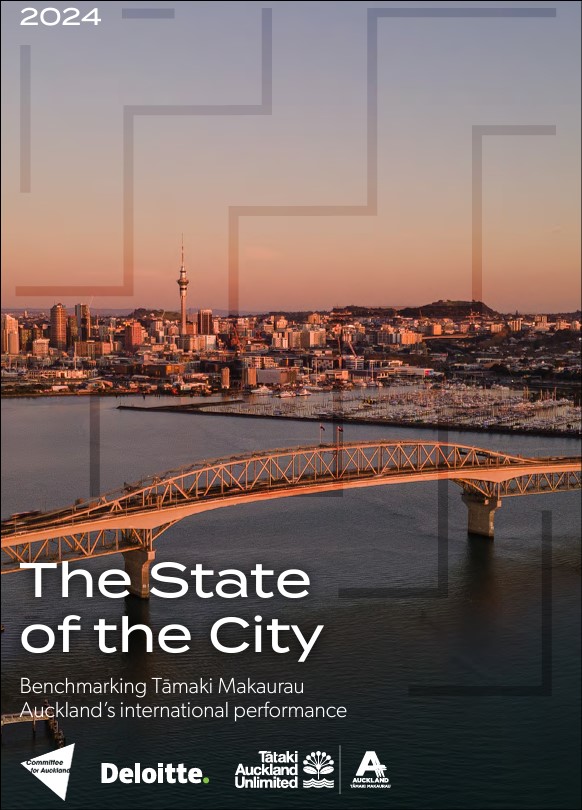The state of the city. Benchmarking Tāmaki Makaurau Auckland’s international performance 2024
Author:
Committee for Auckland, Deloitte, Tātaki Auckland Unlimited, The Business of CitiesSource:
Committee for Auckland, Deloitte, Tātaki Auckland UnlimitedPublication date:
2024Topics:
Environment ,EconomyExtracts from the Executive summary:
Tāmaki Makaurau Auckland’s history, geography and diversity make it highly distinctive among the world’s 10,000 cities.
Auckland is sometimes considered one of the world’s most liveable cities, and in 2024, it is also one of the world’s most diverse. Its identity is shaped by its indigenous Māori heritage, sacred sites (wāhi tapu), meeting grounds (marae), and indigenous language (te reo Māori). Over time, Auckland has accumulated ‘super diversity’ – including influences from Europe, Asia, the Pacific Islands and increasingly the Americas and the Middle East – which enrich the city’s education, cuisine, culture, public policy and urban character.
This State of the City report offers an international perspective on how Auckland is faring on the issues that shape cities’ competitiveness, appeal and resilience in 2024. It once again examines Auckland’s performance among a high calibre group of liveable cities, in a wider context where many more cities across Asia and around the Pacific are adapting and innovating, and where the tasks of cities to decarbonise, become more affordable and address deep social divides have become much more prominent.
This year’s 2nd edition maintains its focus on 10 key pillars of city success. It also looks in more detail at three specific areas where Auckland has work to do: brand identity, diversity and innovation.
An incomplete rebound and a fragile recovery
Auckland has been rebounding after a 2–3-year period where the city had been more acutely affected than most by the knock-on effects related to the pandemic, floods, and price inflation. But challenges remain, especially in the visitor economy, which has yet to recover its pre-Covid levels. Yet there are now several instances where Auckland, is competing successfully for investment and visitors, and there is important progress in certain digital technology sectors. Meanwhile, Auckland’s advantages of amenity and work-life balance have re-surfaced. This has seen the pillars of Opportunity and Place improve in 2024.
But the competition is intense. Other peer cities are successfully attracting talent and retaining more of their existing workforce, while larger hubs in Latin America and Asia are becoming more significant centres of gravity for innovation and technology. In this context, Auckland’s economic dynamism compares less favourably. Shortages and mismatches of skills, lower productivity and lower affordability emerge more sharply in the 2024 data. As a result, Auckland has seen a fall in its Prosperity pillar.
Auckland is resplendent but not responsive. 12 months ago, sustainability was the high point of Auckland’s scores. The city is still credited with being cleaner, greener, pleasant and less threatened by some climate risks. However, Auckland is also increasingly scrutinised and penalised for slower progress on emissions, driving green investment, and delivering or incentivising all the necessary adjustments for an efficient and adaptive city. As a result, the Sustainability pillar has fallen.
Auckland needs relentless focus on delivery if it wants to catch up. Auckland’s housing affordability and transport infrastructure remain well behind. The knock-on effects are steadily eroding the city’s scores in Connectivity, and other pillars too. Auckland is now also operating in a changing national policy context with the formation of a new coalition Government in November 2023. Over the longer term, catch-up to other cities in these areas will rely on significant investment and perseverance, allied to coordinated planning and innovations in how infrastructure is paid for and delivered. ...
...
Implications
If Auckland is to perform better and more consistently in more pillars, there are 3 areas that all need attention:
1. Building up Auckland’s competitive position in key industries. Auckland has laid some important groundwork for high value sectors to grow. The city would benefit from more proactively joining up economic, spatial and infrastructure development to inform where and how future jobs in advanced sectors will cluster, what specialisations will be built up, and what growth and talent settings innovative firms will need. Auckland’s more proactive interventions to encourage co-location and cooperation between research and industry would also benefit from expanded citywide efforts to build complementary skills and investment pipelines and deepen work with major companies and institutions, including around priority places.
2. New Auckland-New Zealand policies that enable scale, speed and coordination in how infrastructure is delivered. Auckland’s scores in Connectivity and Prosperity are likely to turn around and improve only if there is national/local strategic consensus and vision for its infrastructure needs, with infrastructure investments allied to the introduction of devolved resources, regional deals, PPPs, and funding models capable of enabling essential infrastructure projects.
The coalition Government is preparing to launch ‘Regional Deals.’ These deals, together with the establishment of a new National Infrastructure Agency, could provide much-needed medium-term funding tools to deliver infrastructure in coordination with central government. These appear to be a clear priority for Auckland. International experience suggests these deals work better when they are focused on unambiguous economic change outcomes, collaboratively designed with simplified negotiation channels, and organised around the practicalities of delivering specific priorities.
3. Conscientious and collaborative leadership about the city’s direction, appeal, and identity development. Auckland has a culture and diversity advantage that can be used more purposefully to decisively promote the city, remind people of the city’s special qualities, and crystallise the unique value that Auckland presents which separates it from other places. This requires fresh narrative allied to cultural development and innovation in how Auckland expresses its sense of self through its urban form, its economy and institutions. ...
Committee for Auckland, Deloitte, Tātaki Auckland Unlimited, August 2024
See also
Previous edition and quarterly updates
The state of the city. Benchmarking Tāmaki Makaurau Auckland’s international performance 2023
